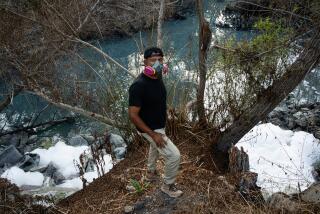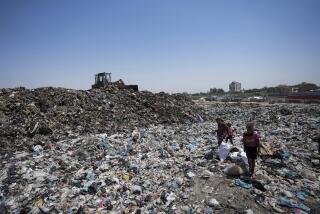Lawsuit Reveals Depth of Pollution in Israeli River
- Share via
HAIFA, Israel — It’s the smell of the Kishon River that first hits you, long before the murky, oily waters are visible.
Yuval Tamir spent years diving dutifully into those waters, inhaling the smell, absorbing the toxins that he believes contributed to the two cancers that he suffers today.
Tamir belonged to an elite sea combat unit, the Jewish state’s equivalent of Navy SEALs. Like hundreds of other divers, he trained in the Kishon, a river that seemingly everyone has always known was the most polluted in the country, ringed as it is by refineries and chemical plants.
Tamir remembers how the Kishon felt, the way it burned the skin. It took 40 minutes with caustic horse soap to remove the river water from his skin after every dive.
But the worst part was the taste. Sometimes you accidentally swallowed some of the water, or were forced to drink it as punishment meted out by an angry commander. Tamir can’t forget that taste, though it’s been 14 years since his last dive. A taste somewhere between chemicals and sewage that seemed to corrode the insides of his body in ways even harsher than the chemotherapy he endures today.
Tamir is one of a growing number of former navy combat divers who trained in the Kishon and who have come forward now to report cancers and strange illnesses--and to ask questions.
He and two other former divers, as well as the widow of a fourth, have sued the government and the military in the Israeli Supreme Court, alleging that authorities were refusing to conduct a meaningful investigation of the Kishon pollution and instead were trying to whitewash any attempts to probe the matter.
In response, and as publicity surrounding the case mounted, the government hastily appointed a blue-ribbon panel headed by a former Supreme Court justice to investigate the claims. Although these kinds of investigations are not uncommon, it is highly unusual for the Israeli military to submit to civilian scrutiny. Tamir and the other plaintiffs are waiting to see how the investigation is conducted.
A country besieged by its neighbors and focused on its very survival, Israel has only in recent years begun to pay attention to the ecological devastation that rapid development has wrought. Environmental experts say Israel is a good 15 years behind the United States in efforts to clean up its dirty air, water and land.
But the outcry over the Kishon is being raised not by environmentalists or fringe activists but by quintessential Israeli patriots--men who fought for their country and now wonder about an insidious, unseen hazard that might have put their lives at risk.
Tamir’s story was first reported in the top-selling Israeli daily Yediot Aharonot. The newspaper has since documented up to 30 additional cases of former divers who contracted cancer. All of the men reported receiving a diagnosis of cancer at a relatively young age--35 to 45--and said they had been in good health and exceptionally physically fit until that point.
All had gone diving in the Kishon.
The Kishon River traverses part of northern Israel and empties into Haifa Bay on the Mediterranean, skirting the city of Haifa, the most heavily industrialized urban center in the country. Chemical plants, oil refineries, an electrical power plant, the world’s largest producer of potassium nitrate fertilizer and Haifa’s entire sewage system have been dumping sludge into the river virtually unabated for decades.
Only in the last five years, forced by court orders and a landmark lawsuit from the Israeli Union for Environmental Defense, have measures been taken by some of the factories to reduce the level of heavy metals and other poisons coursing through their effluence.
The water today, while less contaminated than 10 or 15 years ago, still contains levels of known carcinogens such as cadmium, benzene and toluene, according to toxicology experts.
Training dives in the Kishon, like the ones Tamir participated in, weren’t stopped until the early 1990s. Operational dives, to repair the hulls of ships and other maintenance, continued until May, when the army ordered them suspended after the initial Yediot reports.
Tamir’s SEALs unit is among the most exclusive clubs within the military. Its ranks represent the pinnacle of derring-do, sacrifice and glory. The men who trained in the Kishon went on some of the Israeli navy’s most spectacular secret missions, including forays into the Bay of Beirut during Israel’s war in Lebanon in the early 1980s.
Practicing demolition operations, laying charges, retrieving equipment, staging sea-to-shore raids--all the training done in the Kishon was vital to the SEALs’ mission, the divers say today. Divers needed the turbid blackness that the polluted water provided: The pollution and underwater clutter are the frogman’s camouflage.
The divers knew that they were being prepared for potentially deadly missions, so no one asked questions. The filth and stench of the water seemed the least of their worries at the time, even though some men fainted from the fumes wafting through the air. Told to go into the gunk, they went.
“As highly motivated naval commando warriors, we tackled the waters as part of the challenge,” said Oren Most, who served as a SEAL from 1970 to 1975.
Most, who was born in Los Angeles to a U.S. Navy officer father and an Israeli consular officer mother, is now deputy director of one of Israel’s top cellular telephone companies. He is not sick and is not convinced that the Kishon causes cancer.
But after his former commander and friend’s death last year from brain cancer, Most wants an investigation.
“We were brought up as strong, macho Israelis and wiped off [the river’s poisons] like dust,” said Most, 49. “But as we read and counted the casualties, those who died and who are sick, the number is so large--it accelerates the curiosity. I’ve become very concerned.”
Dr. Yonah Amitai, president of the Israeli Society of Toxicology and an official with the Health Ministry, said a causal relationship between the toxins of the Kishon and the divers’ cancers cannot be determined until each case, including the personal and family medical histories, is examined. But, he said, the severity of the river pollution, the men’s prolonged, unprotected exposure, and the number of cases all point to a connection.
“It seems from the numbers quoted that there is an excess of cancer cases,” Amitai said. “The overall information [raises] concern that this is not due to chance.”
Rafi Livneh, the former commander who died last year from brain cancer at age 49, kept a diary in the final months of his life. His widow, Irit, recalled his matter-of-fact, almost clinical musing of how he might have contracted cancer. Penciled into the diary was his No. 1 suspect: the Kishon.
“How come for 30 years people dived into that water and no one asked what was going on?” Irit Livneh asked. She joined the petition before the Supreme Court but said it was difficult to go up against the military, an institution that was “like a family.”
Tamir dived regularly in the Kishon for a decade ending in 1986. It is the reluctance of the military to acknowledge the problem and take care of the sick that most disturbs him.
“To serve in the [SEALs] unit is to do everything because you want to be the best,” said Tamir, who was born in an Israeli village near the Alexander River and who has always lived within a mile of the sea.
“The army always tells you they will do everything for you if you are hurt,” Tamir said. “But now we are bleeding on the battlefield, and they have left us behind. They do not take responsibility.”
Tamir, who was treated for colon cancer and recently developed skin cancer, now must decide whether to send his draft-age son into the navy to fulfill his compulsory military duty. It would have been a no-brainer a few years ago, but now Tamir thinks twice.
The former diver recently toured the Kishon with a reporter, pointing out the areas where he once plunged into the opaque green waters with a team of underwater combat specialists. Parts of the river were slimy and bubbling. Large pipes could be seen spilling black water into the river, which gave off a harsh chemical smell.
Fish haven’t lived in the Kishon for years. Dead jellyfish floated in between the boats in the harbor. “Everything dies here,” Tamir said.
More to Read
Sign up for Essential California
The most important California stories and recommendations in your inbox every morning.
You may occasionally receive promotional content from the Los Angeles Times.














